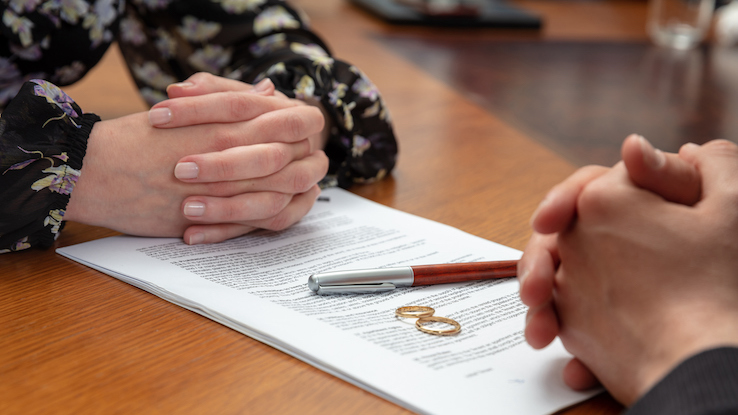Finding the Right Divorce Lawyer for Your Needs

It’s estimated that between 40% and 50% of marriages in the U.S. end in divorce. Although those going through a divorce are not alone in the experience, a divorce can still be time-consuming and emotionally and financially straining. A good lawyer is crucial in removing some of the strain and ensuring a good outcome. We have some tips to help you find the best divorce lawyer for your situation.
What Does a Divorce Lawyer Do?
Generally, divorce lawyers are responsible for protecting their clients’ rights in divorce proceedings. These specialized lawyers don’t merely represent angry couples who are battling it out in court; they can provide legal counsel, draft legal documents, and help clients navigate the legally complex procedures of even a “simple” divorce.
Typical responsibilities of divorce attorneys include:
Providing legal advice for your situation and helping you set priorities
Each divorce is different. A good divorce lawyer will listen to your situation, review relevant documents, and counsel you on the best way to move forward to achieve your goals and prepare for your future. Your lawyer can help you understand the law in your area and help you complete relevant legal paperwork appropriately.
Assisting in the Division of Marital Property
One of the biggest challenges of union dissolution is dividing marital assets–bank accounts, real estate, even furniture. Your legal advisor can help work out property issues. They can also help you set priorities for which assets will most benefit you after the divorce and which you should compromise on.
Addressing Child Custody and Issues
If children are involved in the divorce, their well-being and living arrangements may be a significant concern. The best divorce lawyers can help you address tricky aspects of custody arrangements, such as where the children will attend school, where they will live, how much will be paid in child support, and more. If the parents are having trouble reaching an agreement, divorce lawyers can also recommend child advocates or co-parenting counselors to act in the best interests of the children and help settle disputes.
Contesting for Alimony
Occasionally, one party in the divorce will ask for alimony, a legal duty that directs one party to financially support the other during and/or after the divorce. This is common when one parent has been the primary child care provider. Determining an appropriate amount to ask for or pay in alimony is an important duty of a good divorce lawyer.
How Much Do Divorce Lawyers Cost?
The average hourly rate charged by U.S. divorce lawyers is $270, with the average total cost of divorce coming in at $11,300. The price of a divorce varies, though, depending on how long it takes and how involved the case is. For example, in a case where there are no contested issues (issues that a couple can’t agree on and that need to be settled by a judge), the average person paid $4100. In cases with even one contested issue settled before the court, the cost rose to $10,400.
Most divorce law firms require a retainer fee, an amount you pay before the divorce process starts, which is then put in a trust and used to pay your lawyer’s hourly rate. The average retainer fee stands at $3500 but can range between $2000 to $5000.
It’s important to note that choosing to divorce without the help of lawyers still incurs costs in legal fees. However, these costs are lower than if you had a lawyer. The average spent in a divorce without a lawyer is $295, which covers the divorce fee and completion of forms.
Do You Need a Lawyer to Get a Divorce?
Due to the costs, some people consider proceeding with their divorce without an attorney. Most states do not require an attorney, so this may be possible. However, divorce is complex, and you may not get as fair of a settlement if you opt for self-representation, especially if your spouse has a lawyer.
There are some cases where you may be able to move forward successfully without the help of a lawyer, such as if you have experience interpreting statutes of the law or if you and your former spouse were able to negotiate the settlement without legal help. However, there are some situations where a lawyer is vital:
- If there is a history of abuse
- If there is a major contestation
- If there is a large imbalance of power
- If your spouse has hired an attorney
Even in the simplest uncontested divorce, it is always wise to at least consult a lawyer and have them read over your divorce agreement before you sign.
What to Consider When Looking for a Good Divorce Lawyer
Not all lawyers handle divorce the same way. Some may strive to solve everything before a court hearing through mediation. Others may be skilled at litigation and excel in hotly contested divorces. You will want a lawyer who will create a good rapport with you and be able to support you in your unique situation. If you want the best divorce lawyer for your situation, here are some tips.
Identify Your Budget
Identify how much you can spend on your lawyer. Hiring legal counsel you can’t afford won’t benefit you in the long run. If cost is an issue, there are ways to still receive the legal support you need:
- Contact your local legal aid office.
- Check with local law firms if they have pro bono availability. (Most law firms are also required to perform a certain number of pro bono (free) hours of legal service each year.)
- Contact your local courthouse and see what resources are available.
Check Top Organizations
Top law firms often have a variety of lawyers available to meet the needs of a diverse clientele. Others specialize in specific areas, like divorce. Calling and checking with law offices in your area can help you select attorneys who will best fit your situation.
Then, ask your trusted friends and family who have undergone the divorce process to suggest some good lawyers (or ones to avoid). It may also be good to read online reviews, which can help you spot positive and negative patterns and identify the best divorce lawyers in your area.
Identify Prospective Attorneys and Do Interviews
Once you have done your research and have some names, interview your prospective lawyers either in-person or via phone call. Some lawyers even offer a “free consultation.” In the interview, ask important questions, such as what they charge, how they prefer to move through a divorce settlement, and what their experience is in areas that are likely to come up in your divorce. As you perform the interview, pay attention to whether you feel heard and respected and whether the lawyer explains things in a way you can easily understand. Finding a lawyer who works well with you can make all the difference in your divorce outcome.





